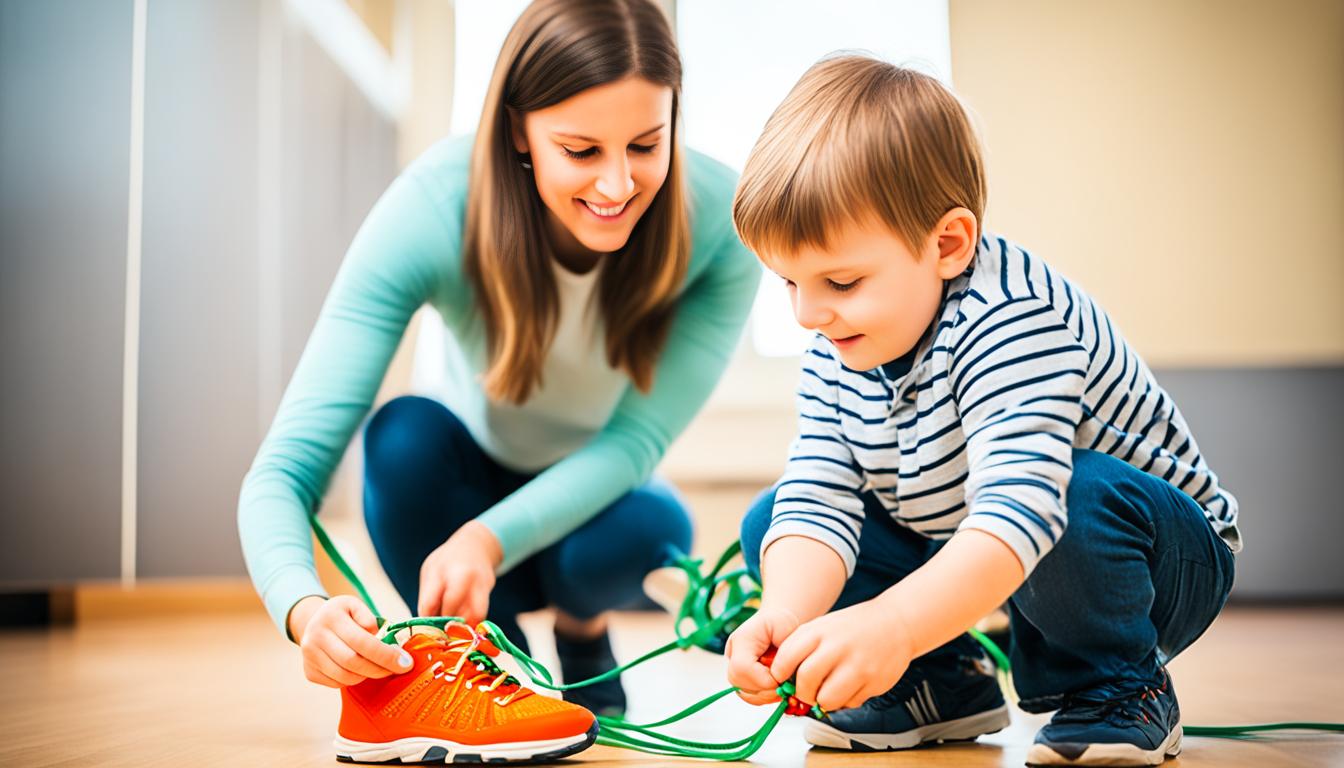Remember when your little one wanted to feed themselves, even if it meant a big mess? Or when they tried to put on their shoes by themselves, refusing your help? These moments are key to their independence. With the COVID-19 pandemic, teaching kids to do things on their own is more important than ever. It might take longer, but it’s worth it for their growth and confidence.
Studies show that starting independence early helps kids develop important life skills. Positive Parenting offers over 36 strategies to help you. These strategies help you support your child’s growth towards self-reliance and confidence. Isn’t it great that letting them tie their shoes themselves builds skills for adulthood?
Key Takeaways
- Encouraging independence in children helps build their self-esteem and sense of self-worth.
- Allowing children to perform tasks on their own promotes perseverance and resilience.
- Everyday actions like dressing themselves or making their beds are vital for Child Development Milestones.
- Providing limited but meaningful choices can enhance decision-making skills and confidence.
- Utilizing Positive Parenting methods can offer substantial support in fostering child independence.
The Importance of Fostering Independence in Children
Encouraging independence in children is key for their growth. It helps build self-esteem and teaches them to handle frustration and keep going. By setting routines, kids learn what to expect each day, making them feel more in control.
Letting kids make their own choices boosts their confidence and sense of freedom. This helps them feel more connected to their own lives.
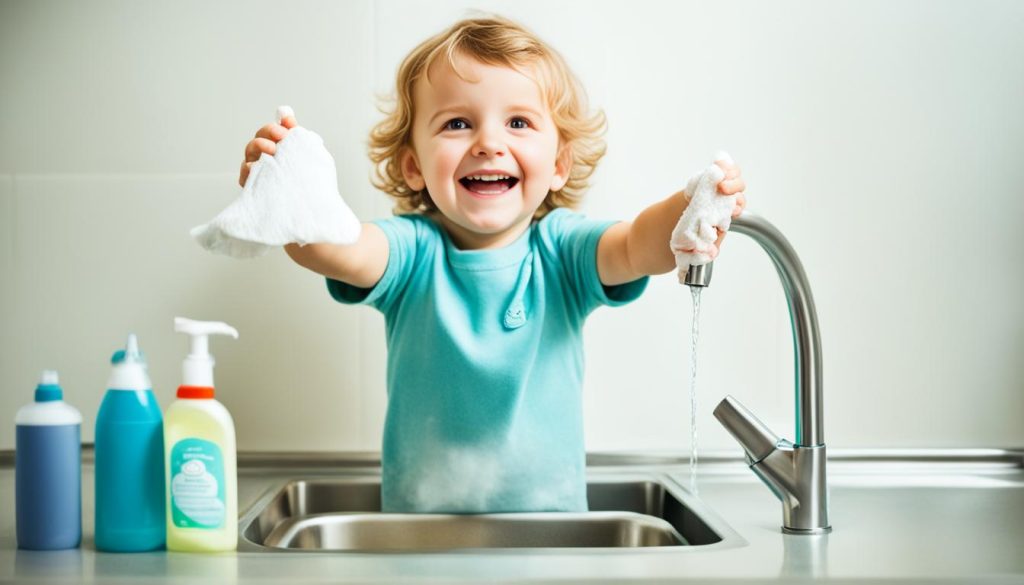
Building Self-Esteem in Children
Building self-esteem is a big part of independence. Praising their efforts helps kids feel good about what they do. It teaches them to value their hard work and the help they get from others.
Teaching kids to be thankful is also key. It helps them see the value in their achievements and the support they have. This boosts their self-esteem even more.
Developing Frustration Tolerance and Perseverance
Letting kids deal with their own frustrations is important. Parents should give them tasks that match their level but support them too. This helps kids learn to keep going, even when it’s hard.
Having set routines can also help. It makes it easier for young kids to handle challenges without getting upset. This helps them see challenges as opportunities to learn.
Letting kids make their own choices is another good idea. It teaches them to solve problems and think for themselves. This prepares them for school and life, helping them make healthy choices and feel proud of their achievements.
This approach empowers children to become more capable and resilient, which is essential for their long-term well-being and confidence.
Here’s a look at how different parenting styles affect kids:
| Parenting Style | Characteristics | Impact on Independence |
|---|---|---|
| Authoritative | High responsiveness and high demands | Promotes independence, self-reliance, and confidence |
| Permissive | High responsiveness with few demands | May result in impulsiveness, lack of self-regulation |
| Uninvolved | Low responsiveness and low demands | Does not support healthy independence development |
These insights can really help you encourage your kids to be independent. It’s a great way to help them grow emotionally and personally.
Establishing Routines to Encourage Self-Reliance
Setting routines helps kids become more independent. Daily routines give them a sense of stability and predictability. This boosts their confidence and independence. Starting routines early helps kids develop good habits and prepares them for the future.
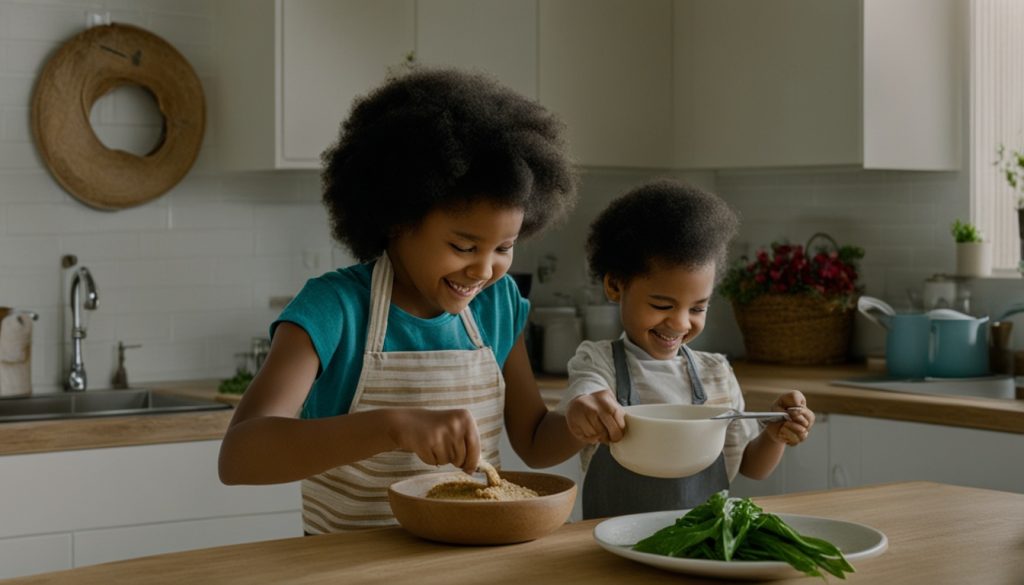
Setting Daily Routines
Daily routines teach kids about consistency and responsibility. Giving them tasks like brushing their teeth or making their bed helps them take charge. These routines make it easier for kids to handle changes and manage their time well.
Making Responsibilities Predictable
Predictable tasks make kids more likely to do them on their own. Tools like routine cards can help with this. Setting clear rules about screen time teaches kids discipline and helps them focus better. These routines help kids develop healthy habits, get ready for kindergarten, and adjust to structured settings.
Regular activities like set meal times and play periods teach kids about scheduling and planning. A study by St. Peter’s Prep found that 85% of students with structured routines did better in school.
Structured routines help your child become more self-reliant and gain important skills for life. Managing screen time is key to keeping a balance and teaching discipline. These skills are crucial for their growth and success.
Embracing Choices and Empowering Decision-Making
Letting your kids make choices helps them learn to make decisions. It also teaches them about responsibility. By giving them a few options, you help them see how their choices affect things. This way, you improve how you talk with your child and help them get better at making friends.
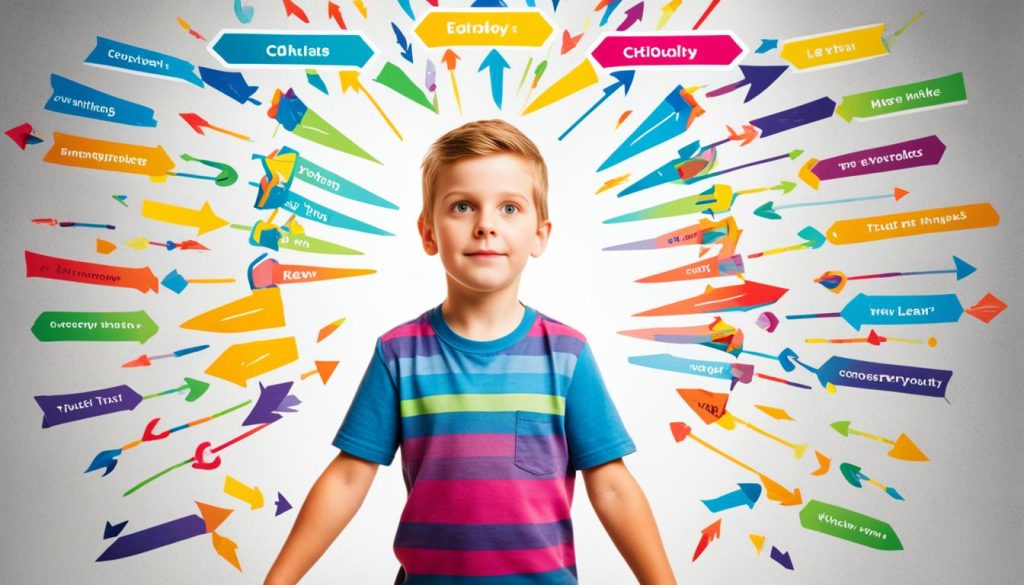
Parents make about 1,750 decisions for their child in the first year. Over time, this can be a lot. It’s good to give your child a few choices to make.
Providing Limited but Meaningful Choices
Giving your child choices helps them feel in charge and independent. Letting them pick their snacks or clothes is a good example. Studies show that making choices helps kids feel more confident and improves how they talk with parents.
Also, choosing healthy snacks is a great way to teach them. For example, letting them pick between fruit or a granola bar promotes healthy eating. It also teaches them about the effects of their choices.
Building Confidence through Decision-Making
Being able to make decisions builds confidence. Adding choices to daily life helps kids grow and feel more sure of themselves. The internet can make it hard to decide, so it’s good to guide them in a flexible way.
Letting kids choose creative activities boosts their creativity. The fear of making the wrong choice can stop them from deciding. But with your support, they learn to trust their gut and think things through. This makes them more confident and helps them make friends.
Giving your child the chance to make decisions is key to their growth. Starting this early helps them handle life’s challenges with confidence and responsibility. A supportive home where they feel heard helps them make good choices on their own.
Incorporating Age-Appropriate Chores
Teaching kids about responsibility starts with age-appropriate chores. It’s important to begin early, even with toddlers, with simple tasks. As they get older, they can take on more complex chores. This teaches them the value of working together in the family.
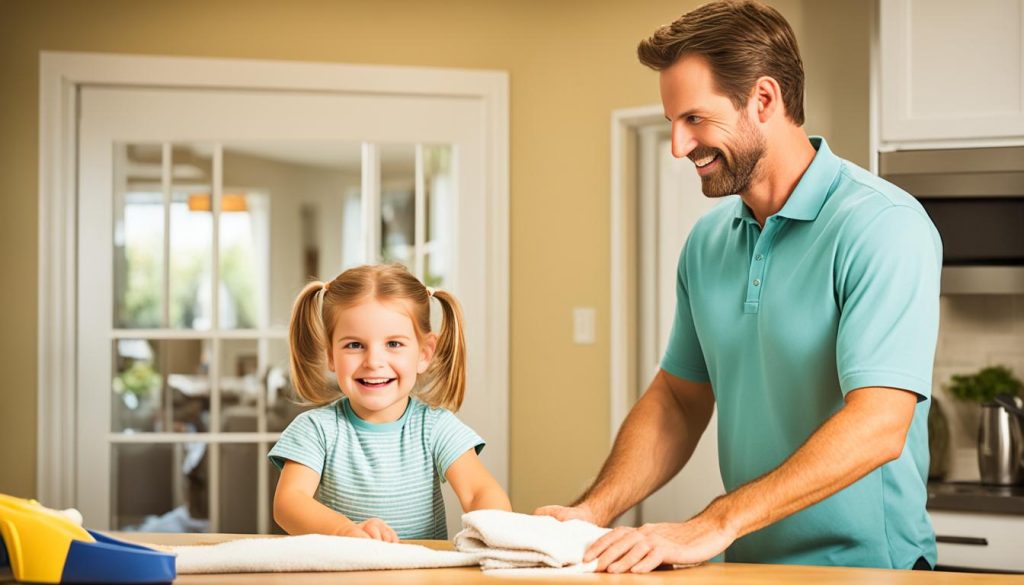
Learning Responsibility through Daily Tasks
Assigning chores based on a child’s age and abilities helps them learn responsibility. For example, 3-5 year olds can pick up toys. Older kids can set the table or load the dishwasher. Teenagers can handle yard work or do chores on their own.
This way, kids see the value of their work and feel proud of their efforts. It also helps them do better in school and with friends. Studies show that kids who help with chores are happier and do better in life.
Developing Teamwork and Empathy
Chores teach kids about teamwork and empathy. Working together on chores helps them value each other’s help. It also helps reduce fights between siblings by giving them common goals.
Cooking together is a great way to bond and learn healthy habits. Reading together can improve vocabulary and strengthen the parent-child relationship. Helping with these chores teaches kids discipline and prepares them for being independent.
Creating a chore schedule that fits the child’s age and abilities is key. Using rewards like sticker charts can help younger kids. Clear responsibilities help older kids become more independent. This builds a strong sense of responsibility and teamwork in the family.
Positive Parenting Techniques to Support Independence
Using Positive Reinforcement Parenting helps kids become more independent. By praising them, listening well, and showing good behavior yourself, you boost their mental health. This also makes your bond stronger.
Using Praise and Reflective Listening
Praise is a key part of Positive Reinforcement Parenting. It makes kids want to do good things again. Reflective listening is also important. It means you listen to what your child says and show you understand them.
This makes kids feel heard and important. A study by the Positive Parenting Research Team at the University of Southern Mississippi shows it works. Kids do better in school and feel happier when parents use these methods.
Modeling Appropriate Behaviors
Kids copy what they see in their parents. So, acting right yourself sets a good example for them. This is key for their mental health and growing up well.
The Gottman Institute found that modeling behaviors helps a lot. Families that learned to be emotion coaches saw big improvements in their kids. By showing how to manage feelings and act positively, you help your child do the same.
A study by Pettit, Bates, and Dodge (1997) showed that supportive parenting helps kids adjust better at school and behave better. This proves that these positive parenting ways work well over time.
| Technique | Benefit | Supporting Data |
|---|---|---|
| Praise | Encourages repetition of positive behaviors | PPRT studies: enhances emotional health and academic success |
| Reflective Listening | Improves Parent-Child Communication | Reduces behavioral issues (PPRT studies) |
| Modeling Behaviors | Fosters mental health, strengthens parent-child bond | 79% improvement (The Gottman Institute) |
Encouraging Creativity and Unstructured Play
Encouraging Child Creativity through unstructured play is key for kids to think on their own and be innovative. Peter Gray, Ph.D., a Psychology Professor, says play is dropping because adults are taking over kids’ activities more. But, free play is vital for kids to be creative, solve problems, and feel good about themselves.
Before, kids played freely every day, but now they often have structured play with adults. It’s crucial to let kids play freely without adult help. By giving them art supplies and household items, you boost their creativity and resourcefulness. Letting them play with their hands and senses makes them more creative and aware of the world.
Also, cutting down on screen time helps kids use their time better, making them more active and engaged. Being outside is great for kids, helping them stay fit and play freely. Letting kids solve problems on their own builds their confidence and decision-making skills, says Vince Gowmon, a play advocate. These skills are key for the 21st century, where being creative and solving complex problems is important.
Research shows 75 percent of kids don’t play enough, highlighting the need for more creative and free play. Albert Einstein believed play is the top form of research. Through their own play, kids learn to make decisions and find what they like. Irene Gunning, CEO of Early Childhood Ireland, says kids know best what they want to play with. Adults should let kids lead in play to let them grow naturally.
Encouraging kids to express themselves freely and play on their own helps them grow and love learning. By watching and valuing their play without helping, you let them feel proud of their work. This approach builds their independence and creative confidence. The role of play in child development is huge; it helps kids overcome fears, practice being adults, and understand their world.
Opportunities for Independent Problem-Solving
Giving kids chances to solve problems on their own is key to making them independent and resilient. By letting them figure things out, you help them gain important life skills and confidence. It’s about letting them take safe risks and not always fixing things for them.
Allowing Safe Risks
Letting kids take safe risks helps them grow and learn a lot. Experts say parents should move from fixing everything to guiding their kids. This change helps kids deal with daily challenges and improve their problem-solving skills.
- Identify the risk or challenge.
- Ensure the environment is safe for exploration.
- Step back and let your child navigate the situation.
- Offer support and guidance when necessary, but avoid intervening too early.
- Reflect on the experience together and discuss what was learned.
This way, kids learn to solve problems by themselves. It also helps them develop skills they’ll use in school and later in life. It makes them confident and independent.
Resisting the Urge to Perfect
Worrying too much about perfection can stop kids from learning to solve problems. Teaching them to deal with mistakes helps them become resilient and think critically. Positive parenting, which praises effort over success, supports a growth mindset. This encourages kids to take on projects by themselves.
Letting kids face their frustrations is important. It teaches them to handle their feelings and get past tough times. Encouraging creative play and reading books about problem-solving are good ways to help them learn these skills.
| Strategy | Benefit |
|---|---|
| Allowing Safe Risks | Encourages stepping out of comfort zones, fosters independence, builds confidence. |
| Resisting the Urge to Perfect | Teaches resilience, supports critical thinking, reduces perfectionism. |
| Emotion Coaching | Helps manage child tantrums, fosters problem-solving mindset. |
This approach helps kids manage tantrums and become independent problem solvers. It lays a strong foundation for them to be resilient and skilled.
Organizing Your Home Environment for Independence
A well-organized home is key for kids to feel independent. Having things like utensils, clothes, and hygiene products within reach boosts their confidence. It helps them do things on their own without needing help.
Teaching kids manners is easy with simple steps like installing hooks or using lightweight hampers. These steps make them tidy and teach them to manage their stuff. It’s a big step in their growth.
When kids help with work and family life, it makes things easier for everyone. Letting them pick and serve their own food helps with nutrition and growth. It turns chores into learning moments, preparing them for the future.
Having set routines helps kids feel safe and secure. A predictable home life helps them deal with changes and improves family bonds. These routines teach important skills like managing time, promoting healthy habits, and lowering stress.
- Toddlers and preschoolers: Set up routines for mornings, evenings, meals, playtime, and baths.
- School-age children: Add activities after school, chores, and homework to their daily plans.
- Teenagers: Create routines for mornings, evenings, chores, family time, and relaxing before bed.
Organizing your home also helps parents feel less stressed and anxious. Routines give parents control during busy times and make daily tasks easier. They reduce arguments and decisions, leaving more time for fun family activities.
Conclusion
Encouraging independence in children is a journey that lays the groundwork for their future. By setting daily routines and giving them chores, you help them grow into self-reliant individuals. This approach also boosts their creativity and problem-solving skills.
Creating a structured yet free environment teaches children valuable lessons. Research shows that positive parenting shapes a child’s personality. It makes them more conscientious and agreeable.
It’s important to talk openly with your kids and teach them about important topics like racism and consent. This helps shape their values and prepares them for the digital world. Talking about money management and diversity also helps them understand the world better.
Children learn a lot from their family, especially from their mothers and grandmothers. As they grow, your guidance is crucial. It helps them deal with emotions and challenges. By teaching them to solve problems on their own and be responsible, you prepare them for the future.
FAQ
How can I encourage independence in my child?
Why is fostering independence important for my child?
How does independence contribute to building self-esteem in children?
What role does daily routine play in fostering independence?
How can I teach my child responsibility through chores?
What are some effective positive parenting techniques to support my child’s independence?
How can unstructured play encourage independence and creativity?
Why is it important to allow children to take safe risks?
What can I do to create a home environment that promotes independence?
How can I effectively balance work and family time to encourage my child’s independence?
This post contains affiliate links. If you click on a link and make a purchase, I may earn a small commission — at no extra cost to you. Thank you for supporting this blog and helping me keep the patterns free! Read the full Affiliate Disclosure & Transparency.
